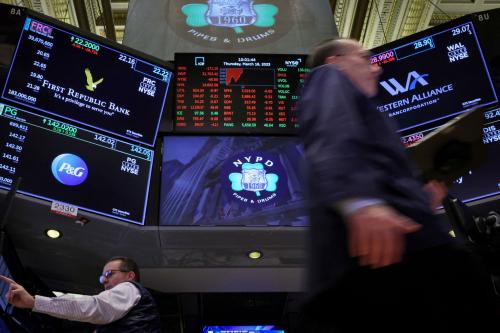This blog post is adapted from a monthly feature in the Brookings Cafeteria podcast called “Wessel’s Economic Update” where Senior Fellow David Wessel discusses recent developments and projections in the economy. The transcript may be slightly edited from the audio recording.
Depending on the headline you read this morning, President Trump’s tariffs are either: a) making America great again b) a tactic that has yet to affect the economy one way or the other, or c) eroding the institutions that produce 75 years of post-World War II prosperity. So which is it?
Scattered across the economy, there’s evidence that the tariffs the U.S. has imposed and the retaliatory tariffs imposed by China and others are biting. Bloomberg reports that Europeans are canceling orders for blue jeans from a 10-year-old North Carolina firm called Raleigh Denim. The New York Times says at least a dozen local newspapers are curtailing publication days because of tariffs on Canadian newsprint. The Wall Street Journal says an electric bike startup called M2S Bikes in North Carolina put plans to build a network of 100 dealers on hold because tariffs boosted the cost of the bikes and motors it imports from China. And in Ohio, Tusco Display, a metal fabricator, furloughed 30 employees; it says tariffs are raising the cost of both domestic and imported steel and aluminum. New England lobstermen say they’ve been squeezed because China has doubled tariffs on seafood imported from the U.S. but lowered the tariffs on Canadian lobsters.
But if you step back and look at the U.S. economy as a whole it’s hard to conclude that the Trump trade war is doing much damage—yet. The economy has been growing, the second quarter was strong, employers have been hiring, the stock market has flinched but it hasn’t crashed. There—again, so far—no sign that industries with greater exposure to foreign sales have been investing or hiring any differently than other industries.
But if you step back and look at the U.S. economy as a whole it’s hard to conclude that the Trump trade war is doing much damage—yet.
Goldman Sachs recently surveyed analysts who monitor 20 sectors of the economy about the impact of the trade war on each of those sectors. They found a lot of worry but not much change in hiring or investment. But the analysts expect profits to be squeezed in nearly half the sectors they cover, and that’s a reminder that things are a lot more complicated than they sometimes seem. There’s a simple-minded assertion that tariffs are fully and always passed along to consumers, but who bears the burden of tariffs? The country that exports or the country that imports, the consumer or the producer, depends on a whole lot of factors. Nonetheless, nothing we’ve seen so far adds up to anything like economic devastation.
So should you relax? No. Why? Well, one, there’s a widespread belief—or maybe hope is a better word—that the trade war won’t get out of control. There’s a truce between the U.S. and Europe and there are hints that Mexico and Canada will agree to changes in NAFTA that allow President Trump to declare victory. But then there’s China, and that’s a different story.
Hopes for a quick compromise, perhaps where China just agrees to buy more of our stuff, have evaporated. The U.S. has imposed tariffs on Chinese goods. China has retaliated. China shows little interest in changing the intellectual property or investment policies that do put the U.S. at a disadvantage. And we know from history that when a rising economic power challenges a hegemon like the United States, economic, political, diplomatic, even military conflicts are likely and can escalate rapidly, sometimes by miscalculation.
Two, the ripple effects of a trade war may go far beyond imports and exports. Say stock market investors decide one day that all this is going badly. Sentiment shifts abruptly; stocks plunge. That can hurt the economy, of course; people have less money to spend. It can also shatter confidence quickly with implications for business investment and hiring, and just because that hasn’t happened yet doesn’t mean it won’t.
Three, tariffs are never simple. Thousands of companies are seeking exceptions to the tariffs and filings to the U.S. government and that’s an invitation for the worst of crony capitalism where favored firms get a break and other firms don’t. The New York Times for instance recently reported that U.S. Steel and Nucor have successfully objected to hundreds of requests by U.S. steel consumers who want to buy foreign steel.
Four, trade gets a bad name these days: offshoring, lost jobs, shuttered factories. There’s a lot to that, but trade has an upside. Low cost imports help workers stretch the weekly paycheck. Foreign competition prevents U.S. firms from growing complacent. Trade and foreign investment and global supply chains make the world economy more efficient, which means more goods and services for less effort, less poverty. All that is put at risk by tariffs and assaults on the institutions like the World Trade Organization that were founded so that nations would be restrained or discouraged from policies that help their economies at the expense of others.
No, the trade war has not yet devastated the U.S. economy, but we may not have seen the worst yet.






Commentary
Wessel’s Economic Update: Are Trump’s tariffs hurting the US economy?
August 17, 2018